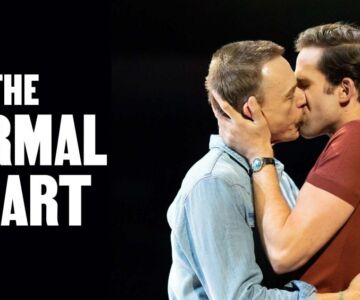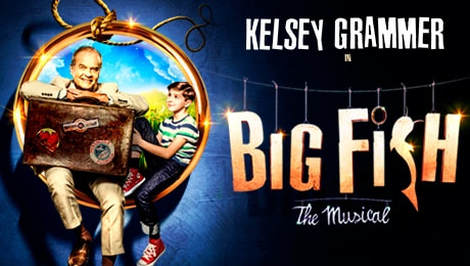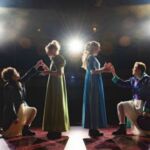 Sondheim's Memory Will Absolutely Be a Blessingby Randi / November 30, 2021
Sondheim's Memory Will Absolutely Be a Blessingby Randi / November 30, 2021The brand new musical Hex is due to open tomorrow night at London’s National Theatre. Given its awesome-sounding premise — it’s a dark musical retelling of the Sleeping Beauty story starring the great Rosalie Craig as the fairy responsible for the curse — I was too excited to wait for opening night. Instead, I saw an early preview and. . .well. . .yeesh. Rather than parroting the fellow audience members we overheard as we left the theatre (“wow what an absolute mess”), I’m going to list some of the questions I hope the creatives can manage to answer before the show is frozen. If these questions can be answered in time, and the holes they address fixed, then there’s a chance this show can be saved. There is so much potential in that elevator pitch, but that potential has unfortunately been left to gather dust with Lorelai’s golf clubs.
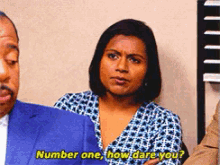
Question 2. What was Fairy’s backstory?
This question gets to the big hole in the show. Fairy’s sad history is hinted at throughout — she’s the only fairy left; she has no wings; she was ‘left behind’ by all her brethren — but we never hear a ‘why’ for any of it. What happened to all the other fairies? Why is this weird schizophrenic* childish being the only fairy left in the land? Why is she so messed up? How did she get so messed up? Why can’t she think straight? Did she suffer trauma? Is she supposed to be special for surviving, or is it just dumb luck — or bad luck? How did she lose her wings? Answers to any of these questions would go far to help develop the character in interesting ways: why she’s so weird, why she’s alone, why her story deserves to be told. But we get zilch.
*not using offensively; she legitimately is portrayed as schizophrenic, displaying classic symptoms including but not limited to: hearing voices, having delusions and hallucinations, being unable to communicate effectively, having abnormal motor functioning, neglecting personal hygiene, having useless/excessive movement, exhibiting bizarre posture, &c. Which, actually, forces a Question 2b: Why is Fairy portrayed as schizophrenic???
Question 3. Why didn’t the queen sleep?
My crim law professor used to go through alleged facts and point out where something “didn’t pass the smell test”. I thought of that frequently during this show. Let’s start at the very beginning: The queen has a new baby who refuses to sleep. The entire castle’s staff is exhausted. So, the queen orders a lackey to go find a fairy to put the baby to sleep. Okay, so, if they had already gotten a doctor and the doctor couldn’t do anything – and couldn’t find anything wrong with the baby underlying the wakefulness – why not just have the staff rotate caring for the baby? I don’t buy that this self-absorbed (annoying, very panto) queen hadn’t slept. She surely would have go to bed in far away quarters each night and left her staff to watch the baby. (And also, if there’s nothing medically wrong, why turn to black magic? But that would undo the whole myth, so whatever.)
Question 4. What urged Fairy’s hex?
An interesting new aspect of this story is the notion that fairies are supposed to only ‘bless’ (give magical favors that the person being blessed actively wants), rather than ‘hex’ (put magic on a person that they don’t want). She found that the baby didn’t want to sleep, and as a result the fairy didn’t want to force the baby to sleep as that would be a hex. (Drink!) Fairy said the baby would sleep when she was tired, i.e. when she wanted to sleep. This wasn’t good enough for the royal family, and they ‘forced’ Fairy to hex the baby to sleep. The forcing made Fairy so. . . something, that she hexed the baby to sleep unendingly once she gets pricked by a thorn (until, of course, the true love’s kiss). But this huge pivotal moment of the story was rushed through so it was unclear why Fairy did such a hex. Yes she was being held captive and she was clearly stressed out, but what made her think of this specific, peculiar curse with all its random details? Why not hex the people who are actually assaulting her, capturing her? Why not put the baby to sleep then and there? Why do such a bizarre hex? Literally one line supporting her action, revealing anything about her mindset, would have been good. Her decision here is the entire foundation of this story, so it needed to be supported at least a little. I keep seeing Michael in The Good Place waving his hand and saying ‘don’t worry about it’ in response to questions.
Question 5. What happened to the staff?
The baby, Rose, grew up sheltered in an attempt to prevent her from ever being pricked by a thorn. But that day finally came when she was a teen, and she fell into her hexed sleep. Rose woke up after 100 years, ostensibly having long been alone in the castle. No one else was there. Did the existing staff really abandon this cursed princess? There was no plan put in place by previous royals to continue keeping watch over this child throughout her slumber, throughout the subsequent generations? I don’t buy that at all! That’s so irresponsible! Abolish the monarchy!
Question 6. Are the murderous thorns supposed to be funny?
The personified ‘thorns’ who pricked Rose to sleep then set about pricking every single prince who tries to enter the kingdom to lift the curse, sending them into long-term sleep as well. (Though it seems at first like straight up murder.) This whole segment is done like a creepier murdery-er version of the Oompa Loompa songs but it’s also clearly supposed to be funny. I found it so cringey. So much murderous energy. So much of an annoying song. So much time devoted to these giant murderous thorns who want to put everyone who crosses their path to sleep forever?? I hated it.
Question 7. How did Rose know wassup?
When Bert* wakes Rose up and they immediately seem to love each other, how did Rose — who has been asleep 100 years and before that lived a completely sheltered childhood to prevent the cursed (two syllables) thorn prick — seem totally in the know about love and sex and I don’t know IMMEDIATELY HAVING TWO BABIES?? She would be a total Nell ta ta, not a regular modern teen who is totally chill with becoming a teen mom with no support system.
*Question 7b. What kind of name for a prince is Bert?
Question 8. What’s going on with the music?
With each of the songs, I struggled to get a handle on what was happening. Instead of a cohesive single song (let alone cohesive score), each movement felt like different groups of small musical phrases smashed together, never coalescing into actual songs with melodies, or foundations, or points. It was a very strange chaotic experience, to think you grasp what a song sounds like and what it’s doing and then have it keep shifting away from you musically, in a lawless deranged way rather than a creative way. And there was so much of the modern pop vocalizing/shrieking/riffing instead of legitimate singing, a trend I truly despise. Of course Rosalie sounds wonderful but her talents are not given enough to work with.
Question 9. Why was the whole second act focusing on the ogre grandmother eating her grandchildren?
This was where every audience member I could see was imitating my favorite little blonde toddler girl gif, you know the one. The action shifted to focus entirely on the ogre queen wanting to eat her grandkids and being unable to control herself. Why, just so much why. Why didn’t Fairy tell Rose that the ogre was after her babies and would probably kill her too and urge her to GTFO RIGHT NOW? Instead Fairy killed some animals to trick the queen into believing she was eating the babies. Is Fairy that inept, that much a bumbling fool? It was insufferable. Why didn’t she just say RUN instead of cowering with the babies? It took a helluva lot more time to hunt down the goat and the rabbit and whatever it was (NOT great sound effects of slaughter btw, could definitely have done without that awful harrowing bullshit) than it would have to just shove the babies into the arms of their mother and shove them all out the door.
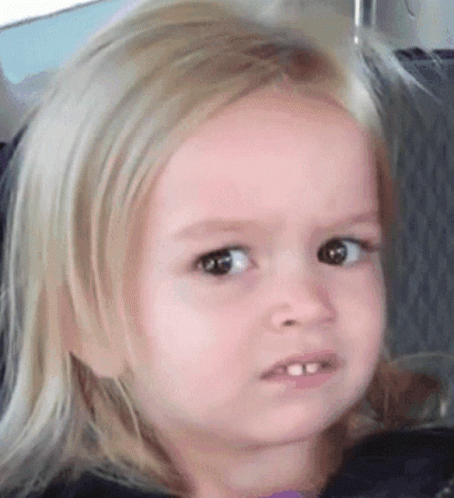
Question 10. Why don’t the book and score match up?
My biggest problem (okay they’re all the biggest) was that the book didn’t make sense on its own, and then the song lyrics didn’t match the book/action at all. It reminded me of the Broadway flop A Tale of Two Cities. In that show, this powerful supporting character spends the whole show wanting to get revenge for her brother, and then in Act II sings her big number, the main lyric of which was ‘out of sight, out of mind.’ Which had exactly zero to do with her character’s situation or the need for revenge for her brother. It was like, wtf?? That’s not what’s happening here, that’s not what you’ve been saying? I thought of that during this show.
Specific songs:
– Bert’s song was both indecipherable and also a heroic pomp-y song but in a creepy minor key. Why that key if it’s supposed to be a pump-up song? It didn’t fit to introduce the character.
– The opening song of Act II, with all the suitors singing about maybe one day finally being the one or one day it’ll be me or maybe this time or whatever, made no sense. These people also just woke up from decades being cursed asleep, and their first thought is about one day winning? getting the prize? (the princess? gross) and not about ‘oh my god where is my family, where is my home, do I not have a home anymore? how many years of my life did I miss?’ What do you mean one day it’ll be you, do you know you just woke up from like 80 years asleep? You just got a miracle second chance done on you and you’re complaining about the before times? Go see about your life, men! Make it make sense.
– The big climactic song about how everyone is different on the outside vs the inside was the greatest example of the aforementioned Tale of Two Cities illogicality. The lyrics do not reflect what had been told in the story. Rose says she’s smart on the outside? She has not lived at all and left two babies unattended for an ogre to catch! Bert says on the outside he’s seen as a hero? He hasn’t done shit heroically yet! No one thinks you’re a hero! Worst of all, the ogre who just thought she happily ate her grandbabies says that she is going to start being true to herself. BEING TRUE TO YOURSELF IS EATING BABIES! You need to work to NOT be true to yourself!!!
Question 11: Why is the promising Rose and Bert conflict treated like an afterthought?
The Rose and Bert conflict is infuriatingly done. He doesn’t believe what Rose says about his mother – that she’s an ogre and so on – and he NEVER DOES believe her, not until his mother reveals the truth herself. Yet afterward, Rose is the one to run after him to apologize, leaving her babies unattended. I mean I guess that’s all believable for an 18-year-old who just woke up but I don’t think it was presented in that way. It seemed actually presented as her needing to apologize to him, which is absolutely bonkers. And it all seemed secondary to Fairy trembling and wincing around the stage and also wanting to be friends with the ogre? When did the ogre become her best friend? See so many questions.
The most frustrating part of this show (okay it’s all the most frustrating part) is that in this climactic segment, instead of having a song about Rose and Bert’s conflict and giving some character depth and development through song as musicals are supposed to do, they give us a silly R&B song for the suitors that lifts right out. Another point in the panto column.
Question 11b: Why does Rose consider the suitors, who she never met until right now, her best friends? They have all been asleep and never met before.
I have more questions, like why is the humor geared to the lowest common denominator? why are there so many elements that evidence a favoring of panto over the musical art form? is this for kids or adults? but I’ve asked enough. With some work, it would be a decent show – it has so much promise in that premise. But it’s presented as though the creatives don’t believe in the premise and instead stuff the hours with low-grade jokes, unfinished sentences, and mere sketches of characters. Hex was unfortunately tonally confused and sloppy. I hope there is time to answer these questions before the show is set so that it can try to find its proper footing.
INFORMATION
Hex opens Wednesday December 15 at the National Theatre. At my performance, Act I ran from 7:20 to 8:38, Act II ended at 9:55. Hilariously, the placards outside the doors said the run time was 2 hours 34 minutes, a mind-boggling specificity that I will never understand the point of announcing.


